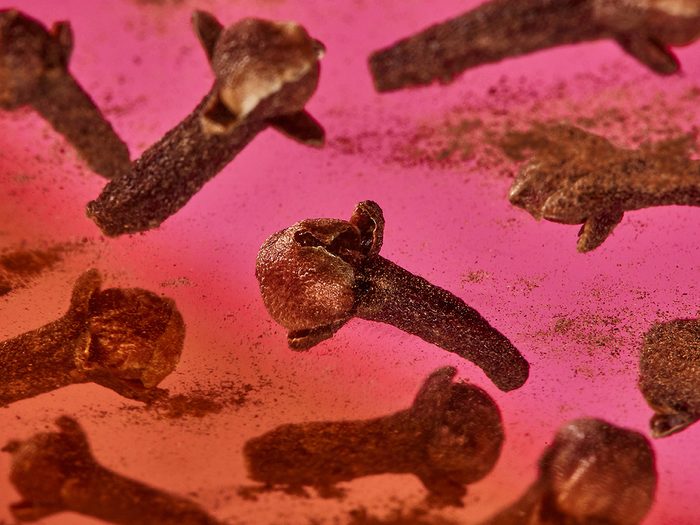Why You Need to Eat More Cloves This Season

This celebrated spice will bring bold flavour to your meals and an incredible aroma to your home. What's more: It offers surprising health benefits.
When you reminisce about the scents of the holiday season, cloves likely come to mind. Whether it’s flavouring the mulled wine that simmers on the stovetop or adding depth to a glazed ham, there is something distinctly warming and festive about this spice. To conjure up memories of comfort and joy during the holiday season and the cold months ahead, use cloves to create everything from hot toddies to hostess gifts this holiday season and throughout the cold months ahead to conjure up memories of comfort and joy.
What are cloves and where do they come from?
While we may associate cloves with snowy weather, they’re actually grown in countries with hot climates. Cloves are the dried buds of flowers that grow on tropical evergreen trees (appropriately named clove trees) and they originate from the Maluku Islands of Indonesia. The Maluku Islands are also known as the “Spice Islands” because of the nutmeg, mace and cloves that grow there. Today, clove trees can be found growing across many regions with hot climates, such as Sri Lanka, Tanzania and Zanzibar.
The health benefits of cloves
The true health benefit of cloves lies in the aromatic oil that’s extracted from them. Eugenol, or clove oil, is a natural painkiller that suppresses the signals sent to the brain through the nerves in response to pain, helping relieve discomfort from inflammation and irritation. Eugenol has been used for many years in dentistry for its gentle anesthetic and antibacterial properties, and is sometimes added to toothpaste to help alleviate toothaches and sore gums.
Apart from offering relief from toothaches, eugenol is also a potent anti-fungal and has been shown to be successful at treating infections, such as yeast infections, especially when combined with prescription treatments. Pure clove oil can be purchased over the counter in health food or specialty stores for external use, but it’s important to note that there’s an upper limit to how much is safe to consume. It can also be irritating, so make sure to stick to the use instructions on the bottle. Most clove oils are highly concentrated; for those, it’s best to dilute them with another oil before using.
Cooking with cloves
Cloves are sometimes called the “Christmas spice” because they turn up in many traditional holiday foods, like mincemeat, mulled wine, gingerbread and baked ham—this can be traced back to the days when spices were expensive and scarce, and only reserved for special occasions. Cloves are also found in dishes and ingredients like garam masala, Chinese five-spice powder, Vietnamese pho broth, Jamaican jerk chicken, Worcestershire sauce and pickle brine.
Although cloves are available in both whole and ground form, whole cloves are preferred for cooking, because the whole bud contains far more flavour and aroma. Whole cloves also tend to have a longer shelf life than ground cloves and will stay fresh for up to one year in a cool, dry place, while ground cloves can lose flavour after a few months. That being said, seek out the best type for the dish you’re cooking. Ground cloves work best for baking and in spice blends—where they pair well with cinnamon, ginger and nutmeg—while whole cloves are best for studding large cuts of meat to gently season them as they slow roast, as well as for adding flavour to drinks like mulled wine and cider. Just make sure to remove the whole cloves after cooking—they’re woody and bitter if you bite into them. In a pinch, you can replace ground cloves for whole—just use ¾ tsp of ground cloves for every 1 tsp of whole clove called for in the recipe.
Decorating with cloves
The use of cloves extends beyond the table to festive decor, too. Another way to use them is to make pomanders, a traditional holiday ornament that is made by studding clementines or oranges with whole cloves to form a decorative pattern. Together, the citrus and cloves give off a pleasant aroma that scents the room, making pomanders great for gifts, table centrepieces, air fresheners and tree decorations. The ornaments are also seen as a symbol of fortune and good luck—perfect for ushering in a new year.
Whether it’s cozy nostalgia or sweet aromas you’re searching for, cloves are the spicy essence of the holiday season. Incorporate them into your cooking, or turn them into deliciously scented decor for guaranteed good tidings.




